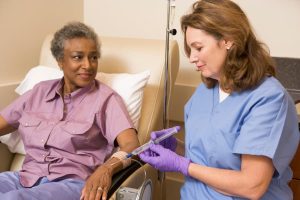
Signs of Precancerous Colon Conditions
Adenomatous polyps are a precancerous condition. They are not cancerous by themselves and are often largely harmless. Their presence, however, indicates abnormal changes to colon
HIPAA Alert: Potential Data Breach Learn More
Questions on Oncology, Hematology and/or Infusion Clinical Services due to COVID-19 Crisis – CALL 833-698-1623
Important Information for Our Patients Regarding the Coronavirus.
RCCA Providing Area Cancer Patients with Access to Care During Coronavirus Outbreak
RCCA Offering Patients Virtual Visits During Coronavirus Pandemic
As the third most commonly diagnosed cancer in the United States, colon cancer each year will affect upwards of 100,000 new American patients. Some colon cancer cases are related to genetics and other non-modifiable risk factors, while other cases are linked to lifestyle choices. Knowing these risk factors is key to avoiding colon cancer altogether or detecting the disease early and enhancing your chances of a positive outcome.
Here are the risk factors we see most often among patients at Regional Cancer Care Associates.
Nearly 90 percent of patients with colon cancer, both male and female, are past age 50, though rarer instances of colon cancer do develop in teenagers and young adults. At diagnosis, the average age of male colon cancer patients is 68, while the average age for women is 72. That’s why as soon as you reach age 50, you should make regular colon cancer screenings part of your overall well-being routine.

Certain ethnic groups, including Ashkenazi Jews, are at an elevated risk for developing colon cancer, though the reason is still unknown. Colon cancer also is one of the leading causes of cancer-related deaths among African Americans, and African Americans are more likely to develop colon cancer at a younger age than people of other races. Because of this, African American men and women should start receiving regular colonoscopies at age 45.

Heredity and personal or family history of colon cancer are risk factors that, like age and ethnicity, are beyond your control. Risk for developing colon cancer is influenced by all of the following:
If any of these risk factors apply to you, your doctor may order genetic testing to determine whether you are prone to colon cancer.
Some colon cancer risk factors are within your control, however. For example, following a healthy diet can greatly reduce your risk.
Consumption of alcoholic beverages increases your risk for developing any kind of cancer. Low-fiber diets are another nutritional red flag, because fiber allows the microbes of the digestive tract to thrive in their community, known as a microbiome. If your microbiome is healthy, your colon cancer risk is much lower.
Consuming a high amount of red and processed meats also may put you in danger. You could be increasing your colon cancer risk by eating:
To err on the safe side, do your best to avoid:
Being inactive elevates your colon cancer risk, and being overweight or obese raises that risk even more. As with diet, you can minimize this risk factor with regular exercise and a healthy, nutritious diet. Your care team at Regional Cancer Care Associates can arrange counseling on nutrition and making healthy lifestyle choices as part of your treatment.
Not everybody with these colon cancer risk factors will develop colon cancer, but if you or a loved one is diagnosed, turn to the experts at Regional Cancer Care Associates. Using the latest technology and most up-to-date methods and techniques, our team of specialists will devise an individualized treatment plan to give you the best outcome possible. For more information, contact Regional Cancer Care Associates today.

Adenomatous polyps are a precancerous condition. They are not cancerous by themselves and are often largely harmless. Their presence, however, indicates abnormal changes to colon

Colon cancer is among the most common cancer types diagnosed in the United States. According to colon cancer projections from the American Cancer Society, about

If you or a loved one has been diagnosed with colon cancer, identifying the treatment approach that’s best for you and your particular circumstances is

Regional Cancer Care Associates is one of fewer than 200 medical practices in the country selected to participate in the Oncology Care Model (OCM); a recent Medicare initiative aimed at improving care coordination and access to and quality of care for Medicare beneficiaries undergoing chemotherapy treatment.